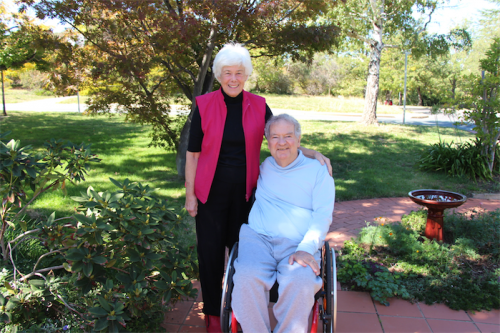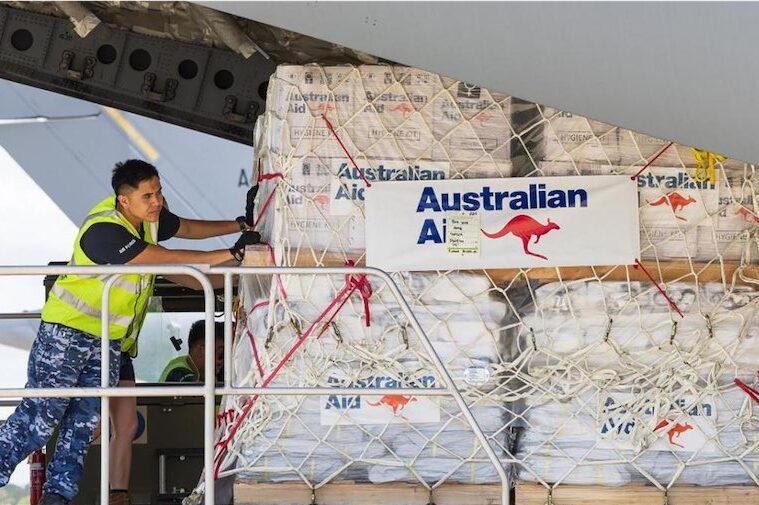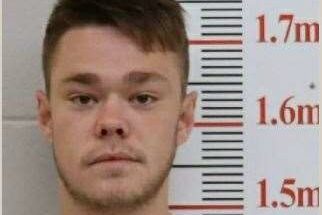
FIVE years ago, Campbell couple Helen and Eugene Holzapfel were on a dream holiday when their lives changed forever.
On the last night of a trip around Europe, the couple was staying with friends in England. In the early morning, Eugene rose to go to the bathroom and, in the dark on an unfamiliar landing, took a wrong turn and tumbled down the stairs.
At the hospital they were told it was unlikely he would ever walk again.
“Our lives turned upside down,” says Helen, 76.
Eugene, now 74, spent six weeks on his back in hospital with not much else to do except look up at the ceiling.
“After, they had to get him up and start to rehabilitate him and he was as weak as a kitten,” Helen says.
“He couldn’t even sign his own name.”
It took about three months for Eugene to build up the strength to travel home to face four months at the Prince of Wales Hospital in Sydney.
During this time Helen had become a bit of a “gypsy” and was travelling back and forth from Sydney to Canberra, while Eugene was finding it hard coming to terms with needing help from people as opposed to helping people.
Then their home was robbed. “I felt really bad because I couldn’t help,” says Eugene.
“None of that was easy and it was pretty hard emotionally and physically. I spent eight months in hospital and wouldn’t have had eight days in hospital previously. It was quite a shock.”
Eventually Eugene was moved to the rehabilitation unit in Canberra Hospital to strengthen his upper body before finally getting home.
“In the meantime, I’m going a bit like a cut snake trying to get the house ready for Eugene,” Helen says.
“I’d had enough of Eugene being in hospital, so I found a wonderful handyman who did everything that was needed to get him home.”
Once he was home, it quickly became clear to Helen that Canberra lacked a lot of services for people with spinal injury.
After befriending three couples who were going back and forth to a spinal gym in Sydney, the group collectively had a think about how they could get one running in Canberra.
“It was just around election time, so we spoke to both the Canberra Labor Party and the Canberra Liberals,” she says.
“They both said they’d help, then Labor got in and said they’d commit $300,000.”
It was a slow process until Helen took charge and found a space in Flynn, which was approved by Spinal Cord Injuries Australia and has now been up and running since late 2017.
It’s been about five years since Eugene’s injury and the couple has learnt a lot along the way.
“For a while it was a lot of trial and error and learning that a lot of stuff was not possible,” Helen says.
“If you go to a restaurant, you have to do quite a lot of work to find out if it’s accessible.
“A lot of places say they’re ‘wheelchair accessible’ but they’re not. There is a code, but it doesn’t seem to be adhered to.”
Eugene says spinal-cord injury is a life-changing thing but it doesn’t happen to a lot of people.
“You don’t have much choice. You have to get on with life and what you’ve got. I had no time to say ‘poor misery me’.”
They decided to put their journey into a book titled “Home, Hope and Helen”.
“I wanted to call it ‘The Cripple and the Carer’ but Helen wasn’t keen,” Eugene laughs.
In it, each chapter is written in the point of view from both Helen and Eugene.
“Originally, I wrote my part as a record for my grandchildren but then when I looked at it I thought there could be other people going through something similar who could get some value from it,” Eugene says.
“As part of our book, we did a little survey asking people with spinal-cord injury what’s important to them.
“Five people put footpaths downs. Just moving around the streets is a big problem.”
Helen says the book isn’t just for people with spinal injury.
“I think life can have an awful lot of ups and downs,” she says.
“It’s about making life work in a situation that I never dreamt I would have been served up.
“What’s important is we’re still together. We still laugh like we used to and we love each other more.”
The book is stocked at Paperchain and Harry Hartog in Phillip, and $2 of every sale goes to Spinal Cord Injuries Australia.
Who can be trusted?
In a world of spin and confusion, there’s never been a more important time to support independent journalism in Canberra.
If you trust our work online and want to enforce the power of independent voices, I invite you to make a small contribution.
Every dollar of support is invested back into our journalism to help keep citynews.com.au strong and free.
Thank you,
Ian Meikle, editor





Leave a Reply